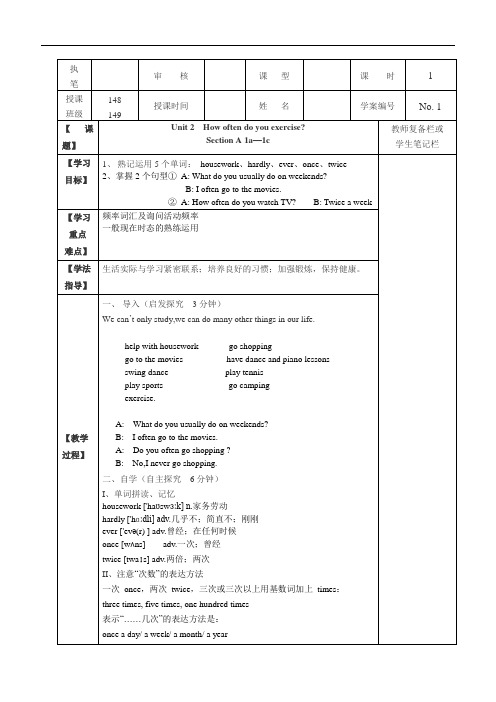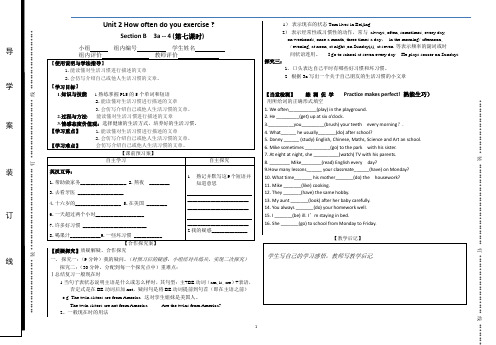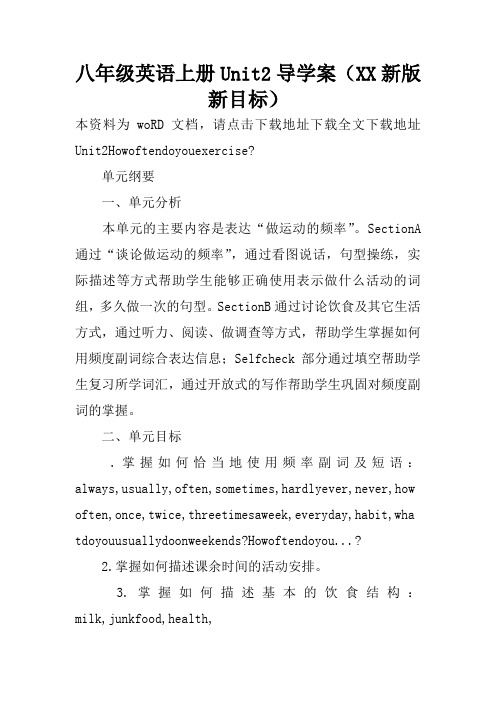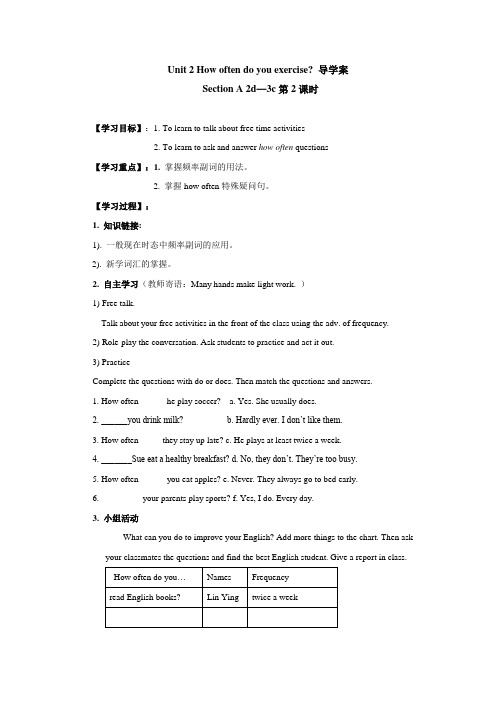2015新目标八年级英语上册学案Unit2精美导学案(共11页)
- 格式:doc
- 大小:115.00 KB
- 文档页数:11

教学反思在新课改的形式下,如何激发教师的教研热情,提升教师的教研能力和学校整体的教研实效,是摆在每一个学校面前的一项重要的“校本工程”。
所以在学习上级的精神下,本期个人的研修经历如下:1.自主学习:我积极参加网课和网上直播课程.认真完成网课要求的各项工作.教师根据自己的专业发展阶段和自身面临的专业发展问题,自主选择和确定学习书目和学习内容,认真阅读,记好读书笔记;学校每学期要向教师推荐学习书目或文章,组织教师在自学的基础上开展交流研讨,分享提高。
2.观摩研讨:以年级组、教研组为单位,围绕一定的主题,定期组织教学观摩,开展以课例为载体的“说、做、评”系列校本研修活动。
3.师徒结对:充分挖掘本校优秀教师的示范和带动作用,发挥学校名师工作室的作用,加快新教师、年轻教师向合格教师和骨干教师转化的步伐。
4.实践反思:倡导反思性教学和教育叙事研究,引导教师定期撰写教学反思、教育叙事研究报告,并通过组织论坛、优秀案例评选等活动,分享教育智慧,提升教育境界。
5.课题研究:立足自身发展实际,学校和骨干教师积极申报和参与各级教育科研课题的研究工作,认真落实研究过程,定期总结和交流阶段性研究成果,及时把研究成果转化为教师的教育教学实践,促进教育质量的提高和教师自身的成长。
6.专题讲座:结合教育教学改革的热点问题,针对学校发展中存在的共性问题和方向性问题,进行专题理论讲座。
7.校干引领:从学校领导开始,带头出示公开课、研讨课,参与本校的教学观摩活动,进行教学指导和引领。
8.网络研修:充分发挥现代信息技术,特别是网络技术的独特优势,借助教师教育博客等平台,促进自我反思、同伴互助和专家引领活动的深入、广泛开展。
我们认识到:一个学校的发展,将取决于教师观念的更新,人才的发挥和校本培训功能的提升。
多年来,我们学校始终坚持以全体师生的共同发展为本,走“科研兴校”的道路,坚持把校本培训作为推动学校建设和发展的重要力量,进而使整个学校的教育教学全面、持续、健康发展。

1Section B 3a -- 4 (第七课时)小组组内编号 学生姓名 【质疑探究】质疑解疑、合作探究一、 探究一:(9分钟)我的疑问。
(对预习后的疑惑,小组结对兵练兵,实现二次探究)探究二:(30分钟,分配到每一个探究点中)重难点: Ⅰ总结复习一般现在时1.当句子表状态说明主语是什么或怎么样时,其句型:主+BE 动词(am, is, are )+表语, 否定式是在BE 动词后加not ,疑问句是将BE 动词提前到句首(即在主语之前) e.g. The twin sisters are from America. 这对孪生姐妹是美国人。
The twin sisters are not from America. Are the twins from America? 2、一般现在时的用法1).表示现在的状态Tom lives in Beijing.2).表示经常性或习惯性的动作,常与 always, often, sometimes, every day, on weekends, once a month, three times a day , in the morning/ afternoon, / evening, at noon, at night ,on Sunday(s), at seven 等表示频率的副词或时间状语连用。
I go to school at seven every day. He plays soccer on Sundays. 探究三:1. 口头表达自己平时有哪些好习惯和坏习惯。
2. 根据3a 写出一个关于自己朋友的生活习惯的小文章【当堂检测】 练 测 促 学 Practice makes perfect! 熟能生巧) 用所给词的正确形式填空1. We often___________(play) in the playground.2. He _________(get) up at six o ’clock.3.__________you_________(brush) your teeth every morning ?.4. What______ he usually_______(do) after school?5. Danny ______ (study) English, Chinese, Maths, Science and Art an school.6. Mike sometimes __________(go) to the park with his sister.7. At eight at night, she __________(watch) TV with his parents.8. ________ Mike________(read) English every day?9.How many lessons______ your classmate______(have) on Monday? 10. What time_______ his mother_______(do) the housework? 11. Mike _______(like) cooking.12. They _______(have) the same hobby.13. My aunt _______(look) after her baby carefully. 14. You always _______(do) your homework well. 15. I _______(be) ill. I ’m staying in bed.16. She _______(go) to school from Monday to Friday.【教学后记】********************* 装 ******************************** 钉 *********************** 线 ******************************************** 装 ******************************** 钉 *********************** 线 ********。

八年级上册英语学案Unit2(完整版)(Go for it)新目标人教版八年级上册英语学案 Unit 2(完整版)Unit 2 What’s the matter?Section A一、学习目标1.知识目标:Can remember the words;matter, have a cold, stomachache, Sore, back, arm, eye, foot, hand ,head, leg, mouth, neck, nose, stomach, tooth, throw at.2.能力目标:Talk about the health and give advice.3.情感目标:学习关心他人和照顾自己的健康二、学习重难点:三、学习过程:Can express like these:—What’s the matter with you?—I have a toothache.—You should see a dentist.(一)预习导学.Translate the following.1.感冒2.胃疼3.脚4.头5.牙齿6.喉咙疼7.躺下来休息8.加蜂蜜的热茶9.牙医 10.感到身体好 11.太差了 12.多喝水(二)自主学习:1a, 1b, 2a and 2b(三)合作探究1c,2c,3a,3b and group work.(四)梳理归纳:1.学习重点:2.学习收获:四、典题赏析:1.—How is your grandma?—He is not .A. feel wellB. feel goodC. feeling wellD. feeling good简析:形容词表示身体健康的,又是进行时,故选C.2.I’m really busy because I have homework to do at the moment.A. too muchB. too manyC. much tooD. many too简析:too much 加不可数名词,too many 加名词复数.much too 加形容词或者副词,故应选C.3. He (be) a history teacher five years ago.简析:ago以前句子用一般过去时,故填was.五、中考链接。

八年级英语上册Unit2导学案(XX新版新目标)本资料为woRD文档,请点击下载地址下载全文下载地址Unit2Howoftendoyouexercise?单元纲要一、单元分析本单元的主要内容是表达“做运动的频率”。
SectionA 通过“谈论做运动的频率”,通过看图说话,句型操练,实际描述等方式帮助学生能够正确使用表示做什么活动的词组,多久做一次的句型。
SectionB通过讨论饮食及其它生活方式,通过听力、阅读、做调查等方式,帮助学生掌握如何用频度副词综合表达信息;Selfcheck部分通过填空帮助学生复习所学词汇,通过开放式的写作帮助学生巩固对频度副词的掌握。
二、单元目标.掌握如何恰当地使用频率副词及短语:always,usually,often,sometimes,hardlyever,never,how often,once,twice,threetimesaweek,everyday,habit,wha tdoyouusuallydoonweekends?Howoftendoyou...?2.掌握如何描述课余时间的活动安排。
3.掌握如何描述基本的饮食结构:milk,junkfood,health,三课时安排SectionA2课时SectionB2课时Self-check1课时Unit2Howoftendoyouexercise?备课时间:XX-08-23主备人:郑志彦审核人:八年级英语备课组授课人:SectionA1a—2c(第1课时)【学习目标】:.会读背单词always,usually,often,sometimes,never,twiceaweek,onw eekends2.正确运用频率副词表述人们的行为并学会用Howoften来进行提问3.一般现在时的特殊疑问句。
【学习重点】:会运用频率副词来表述人们的行为并学会用Howoften来进行提问【学习过程】:一、自主学习,整体感知英汉互译gotothemovies看电视take/___exercise锻炼dosomereading做家务打扫每周一次goshoppinghardlyever每月两次threetimesayear二、合作交流,文本探究.了解下列频率副词,写出其汉语意思always_______usually________often______sometimes_____hardlyever_______never_________2.A:HowoftendoyouwatchTV?B:Twiceaweek.这是询问别人做某事_______的句型,常用于一般疑问句中。

八年级上册英语导学案Unit 2 How often do you exercise?P eriod 1 Section A 1a-2c学习目标知识目标1,口.笔头掌握以下句型A: What do you usually do on weekends? B :I usually exercise .A: What does he do on weekends ? B:He sometimes watches TV.A:How often does he surf the Internet?B:He surfs the internet once/twice /three times a week.2熟练掌握以下词汇:exercise , hardly , ever , once , twice , time, Internet, program.3.灵活运用以what 开头的一般现在时的特殊疑问句。
4.用how often 对动作频率进行提问,并掌握其答语。
技能目标:听懂用一般现在时谈论人们经常做某事的对话并熟练运用目标句型进行会话。
情感态度:通过学习,培养健康意识及良好的生活习惯。
[来源:学。
科。
网]课前准备I.将下列单词根据词义按照频率由高到低排列出来,并且译为中文.hardly ever,sometimes ,always ,often,usually,never100%,_______( ),_______________ ( ),_______ ______( ), _______( ),________________( ),_____________ ( ),0%II.翻译词组.watch TV_________________ go shopping _________________r ead a book _____________ exercise___________________III.列举你在周末通常做的活动。

Unit 2 How often do you exercise? 导学案Section A 2d—3c第2课时【学习目标】:1. To learn to talk about free time activities2. To learn to ask and answer how often questions【学习重点】:1. 掌握频率副词的用法。
2. 掌握how often特殊疑问句。
【学习过程】:1. 知识链接:1). 一般现在时态中频率副词的应用。
2). 新学词汇的掌握。
2. 自主学习(教师寄语:Many hands make light work. )1) Free talk.Talk about your free activities in the front of the class using the adv. of frequency.2) Role-play the conversation. Ask students to practice and act it out.3) PracticeComplete the questions with do or does. Then match the questions and answers.1. How often ______he play soccer? a. Yes. She usually does.2. ______you drink milk? b. Hardly ever. I don’t like them.3. How often _____they stay up late? c. He plays at least twice a week.4. _______Sue eat a healthy breakfast? d. No, they don’t. They’re too busy.5. How often ______you eat apples? e. Never. They always go to bed early.6. _________ your parents play sports? f. Yes, I do. Every day.3. 小组活动What can you do to improve your English? Add more things to the chart. Then ask your classmates the questions and find the best English student. Give a report in class.How often do you…Names Frequencyread English books? Lin Ying twice a weekFor example:Lin Ying reads English book twice a week...__________________________________________________________________________________________________________________________________________________________________________________________________________________________________________________________________________课后作业1. Complete the chart with activities you do and don’t do. What about your mother/ father?always usually often sometimes hardlynevereverImotherorfather2. Write five sentences using the information above.【学习小结】(教师寄语:No man can do two things at once.)1. 总结一下本课时学到的词汇。
Unit 2 How often do you exercise?一、词型转换Section A1.ever →(反义词) never2.shop →(现在分词) shopping3.full →(反义词) empty4.read →(pt.) readSection B→(v.)act1.active→(n.) activity2.health →(adj.) healthy →(反义词) unhealthy3.body →(pl.) bodies4.die →(pt.) died5.write →(n.表人) writer6.keep →(pt.) kept →(pp.) kept7.little →(比较级) less→(最高级) least8.though →(同义词) although二、短语归纳Section A1.how often 多久一次2.read English books 看英语书3.of course 当然4.on weekends 在周末5.go to the movies 去看电影6.hardly ever 几乎不;不曾7.every day 每天once a day 每天一次8.twice a week 每周两次three times a month 每月三次e the Internet 上网10.have dance and piano lessons 上舞蹈和钢琴课11.play tennis 打网球12.help with housework 帮忙做家务13.at least 至少,不少于Section B1.junk food 垃圾食品2.drink milk 喝牛奶3.three or four times a week 一周三到四次4.eat fruit 吃水果5.want sb. to do sth. 想要某人做某事6.be good/bad for 对……有好处/坏处7.go camping in the country 去乡下露营8.play sports 做运动9.one to three times a week 一周一至三次10.such as 例如11.fifteen percent of our students 我们百分之十五的学生12.go to the dentist 去看牙医13.more than 多于14.less than 少于重点句子1.how often do you exercise?你多久锻炼一次2.—What do you usually do on weekends?—周末你通常干什么?—I usually play soccer.—我通常踢足球。
Unit 2 What’s the matter?I. Teaching aimsi. Vocabularya) body partshead, nose, eye, ear, tooth, neck, stomachache, back, leg, arm, foot, throat, mouth, handb) illnessesthirsty, stressed out, tired, hungry, ·cold, fever, headache, toothache, stomachache, sore throatc) advicedentist, lie, rest, honey, water, should, shouldn’td) othershear, until, important, get, western, believeii. Target language:a) What’s the matter?I have a headache.b) What’s the matter with him/her? He has a stomachache. / She has a toothache.c) You should go to bed.d) He shouldn’t eat anything for 24 hours./ She should see a dentist.e) Do you have a cold?f) When did it start?g) I’m not feeling well.h) That sounds like a good idea.i) That’s too bad. I hope y ou feel better soon.iii. Function1. To know the body parts vocabularies (the basic and the extended)2. To talk about health3. To give some advice and make suggestion about healthiv. Value and emotion:To keep healthy is really very important to all of us.II. Important and Difficult PointsTo talk about health problemsModal should/shouldn’tIII. Teaching proceduresPeriod IStep 1 Lead—in“More and more people think health is the most important thing for everybody in modern society. And do you agree with them? Next, we will talk about some health problems andStep 2 Naming body partsAsk the Ss to say as much body parts words as possible with pointing to his corresponding body parts, and T write the difficult ones down on the blackboard and read them. Ask Ss to look at the body and facial pictures on the screen (ppt.) to recognize the key body parts words. Read some new ones. Ask Ss to finish 1a on SB page 7, then check answers.Step 3 Talking about illnessesAsk Ss to look at the pictures on the screen and talk about the illnesses in pairs. Lead Ss to know 4 kinds of expressions about asking and answering health problems. Ask Ss to try to summery the 4 expressions about asking the illnesses. Ask Ss to listen to 1b twice. First ask Ss to write down the illness of 5 persons, then match the names with the pictures. Second ask them to do a spot dictation. At last check the answers .Step 4 Giving adviceAsk Ss to review the expressions about making suggestion, and write down the blackboard as much as possible, then lead Ss to know which is more useful when talking about health problems. Ask Ss to listen to 2a,2b on SB page 8 twice. First ask them to get the main idea of the conversations then match in 2a, second ask them to do a spot dictation.Step 5 SummaryHomework:1. Divide the words in the list into several types and copy them.2. Write 4 conversations between the doctor and the patient .Blackboard Design:Ask Ss to review the body parts words and expressions about talking about illnesses and giving advice by playing 2 games. Ask 1 student to speak out the body parts words and another 4 Ss to compete the reaction speed by pointing to their body parts , and the slowest will be got out. Ask 1 student to act out illnesses and 2 Ss compete to speak out the problem as quickly as possible then give some advice using different expressions.Ask Ss to look at the 4 pictures in 2b on SB page 7 to make conversations about giving advice.Step 2 Role playAsk Ss to finish 3a in section A and explain some key sentences .Then ask Ss to imitate the conversations in 3a to make a role play and ask some pairs to act out what happens between doctor and patient.Step 3 Learn some description words and phrases about health problemsT. gives some easy adjs about health problems such as hungry or tied, then ask Ss to list some other words or phrases ,and write down on the blackboard. Ask Ss to look at the pictures on the screen( 1a section b) then answer “What’s the matter?”“What advice can you give?”Step 4 Make a survey and reportDivide all Ss into 8 groups and ask Ss to do surveys in their groups, then fill in the chart on the screen (ppt) about illness and advice. At last ask them to write a report.Step 5 SummaryHomework:1.Write the report on the homework book.2.Finish the Tests package unit 2Blackboard Design:Ask Ss to review the words and expressions about illness feelings and giving advice (should/ shouldn’t) . Ask Ss to look at the 4 pictures on the screen to make conversations about illness and giving advice.Step 2 Finishing listening part 2a and 2b in section BAsk Ss to listen to the tape twice-- fill the chart and do a spot dictation, then check the answers.Step 3 “Dr. know” taskGive 4 situations about something wrong with body and mental, then ask Ss to give some advice according to the situations (should /shouldn’t), as much as possible. Write them on the black board and ask Ss to write a composition about one situation. Ask some Ss to read the composition to others and correct mistakes.Step 4 Reading partAsk Ss to go through 3a in section B and get the main idea, then answer the questions on then screen—true or false, if it is false, ask them to correct it. Analyze the structure and some key sentences of part 3a after answering each questions. Ask Ss to summery the yin and yang problems and corresponding advice.Step 5 Finish part 3b of section BAsk Ss to read 3b and fill the blanks by themselves, then ask some Ss to show their opinions. Explain key points.Step 6 DiscussionDivide all Ss into 8 groups and ask Ss to discuss in their groups----What is a healthy lifestyle? Then fill the chart on the screen—what should we do /shouldn’t we do to keep healthy?Step 5 SummaryHomework:Finish exercise book <<三新>>unit 2Blackboard Design:Step 1 Review unit 2Ask Ss to say the words and expressions in unit 2 as much as possible , and ask them to make conversations using the words and expressions.Step 2 ExercisesAsk Ss to finish the exercises in self check part 1 then check answers. Explain key usages.Step 3 Finish part 2 in self checkExplain the student exchange program then ask Ss to read part 2 loudly and list “What problems are Sally facing in China?”then explain the key points. Ask Ss to give some advice about Sally’s problems and write on the blackboard.Step 4 WritingAsk Ss to write back to Sally according to the advice given just now.Homework:1.Write 3a in section b from memory and translate it into Chinese.2.Do some exercises.Blackboard Design:。
Unit 2 How often do you exercise?Section A(1a--2d)翻译:(1)帮助(2)购物(3)每天(4)在周末(5)一周一次(6)一月两次(7)多久一次(8)去看电影(9)怎么会(10)几乎不基础演练:1.help sb do sth / help sb with sth 帮助某人做某事hardly ever 几乎不,几乎没有be full of 充满......How come 怎么会,为什么How often 多久一次能力提升1.My mom goes shopping (two ) a week.2.Do you do eye (exercise) every day .3.----How often she English books. -----She English books every day(read )4.What is your favorite TV p ?5.He often works late at night ,so he hever goes to bed early .6.I watch TV o a week.Section A(grammar Focus--3c)翻译(1)帮助(2)看电视(3)读英语书(4) 至少(5)进行体育活动(6)熬夜到很晚1.sometimes 有时,位于句首,句中或句末sometime某时用于一般过去时或一般将来时some time 一段时间some times多次用Sometimes,sometime ,some time , some times 填空(1)---When will we hold the meeting ? ---next week.(2)----How long did you live in the country?----For(3)---Have you ever been to Shanghai?----2.maybe与may be的区别Maybe 副词句中有谓语动词位于句首;may be 情态动词+动词原形3.at least至少-----(反)at most 至多能力提升1.She usually play s baseball on weekends.(对划线提问)2Tom watches TV once a week.(对划线提问)3.Mary does her homework after school.(改为否定句)4.He likes watching Animal World.(对划线提问)5.Many students play sports every day.(改为一般问句)6.Cindy drinks milk at least once aweek.(对划线提问)Section B(1a--1e)Proverb:No pains no gains.不劳无获。
八年级上册英语导学案Unit 2 How often do you exercise?P eriod 1 Section A 1a-2c学习目标知识目标1,口.笔头掌握以下句型A: What do you usually do on weekends? B :I usually exercise .A: What does he do on weekends ? B:He sometimes watches TV.A:How often does he surf the Internet?B:He surfs the internet once/twice /three times a week.2熟练掌握以下词汇:exercise , hardly , ever , once , twice , time, Internet, program.3.灵活运用以what 开头的一般现在时的特殊疑问句。
4.用how often 对动作频率进行提问,并掌握其答语。
技能目标:听懂用一般现在时谈论人们经常做某事的对话并熟练运用目标句型进行会话。
情感态度:通过学习,培养健康意识及良好的生活习惯。
学优高考课前准备I.将下列单词根据词义按照频率由高到低排列出来,并且译为中文.hardly ever,sometimes ,always ,often,usually,never100%,_______( ),_______________ ( ),_______ ______( ), _______( ),________________( ),_____________ ( ),0%II.翻译词组.watch TV_________________ go shopping _________________r ead a book _____________ exercise___________________III.列举你在周末通常做的活动。
________________________________学习过程: ListeningBefore listening1. 检测课前准备II在1a中写出你周末的活动,越多越好哦!2. 结合课前准备II和III进行小组活动,和同伴们谈论周末的活动。
A:What do you usually do on weekends ?B: I often/usually…..While listening1. 听录音, 完成任务1b。
2. 听第二遍录音,和同伴说一下你所听到的含频度副词的句子3.模仿秀:跟读录音,注意模仿频度副词的语音语调。
观察与思考:通过听力,你能试着总结一下所填频度副词的含义及它们的区别吗?————————————————————————————————————————。
4听录音,完成2a. 5.听第二遍录音,完成2b. 6.听两遍录音,完成下面的对话。
Reporter : So, Cheng ______ ______do you watch TV?Cheng : Hmmmm….about _____ _____ _____, I guess.Reporter: Uh-huh.And how often do you read? 学优高考网gkstk]Cheng : Oh, I read ______ _____ at school.Reporter: How often do you go to movies?Cheng : Uhh…let’s see…maybe once a month?Reporter : How often do you exercise?Cheng: Oh, I exercise about ____ ____ ____ _____.Reporter : How often do you shop?Cheng : Shop? I shop about …about _____ _____ ______.7.模仿秀:听录音中的重点句段,反复跟读,模仿语音语调。
观察与思考:通过听力填空,你能体会出“how often”的含义吗?____________。
用来回答“how often”的短语有什么特点?_____________.A fter listening1. pairwork 完成课本2C。
2.Make a survey 调查小组成员的日常活动,以及他们多久做一次。
R eport like this :In my group , I have three friends . I watch TV every day . Tom watches TV three times a week. Jack watches TV only once a week…知识巩固 I.单项选择.1. -I like English very much , so I _____listen to the tape in the morning.A. usuallyB. hardly everC. neverD. sometimes2.-What does your father do in the evening ? -He usually ______.A. watch TVB. exercisesC. read booksD. run3.-How often do you go home? -_____. A.One a week B.Once C.One D.Once a week4.-_____do your grandparents come to see you ? -Twice a week.A. How oftenB.How manyC. WhenD. What5.What ____she ____on weekends? A.is , do B.does, does C.do , do D.does, doII.句型转换。
1. He does his homework every day .(改为一般疑问句)_____ he ____his homework everyday?2. He goes skateboarding twice a week.(对划线部分提问)_________ _________ __________he go skateboarding ?3. Lin Tao always helps me with my Chinese.(对划线部分提问)________ ________does Lin Tao help you with you Chinese?4. Tom goes to bed at ten in the evening .(改为否定句)Tom _________ __________ to bed at ten in the evening.5. He plays volleyball on weekends.(对划线部分提问)_____ _____he _____ on weekends?课堂反思1.本节课我们学了哪些表频率的副词和短语?________________________________ 学优高考网gkstk]2.询问别人多久做一次某事要用什么句型?_____________________________________通过本课的学习,你还有哪些疑问? ________________________________________家庭作业1.跟读并表演2b的对话。
2.依据下一个学案的学习目标做好课前准备。
Period 2 Section A 2d-3c学习目标知识目标:1.口、笔头掌握以下句型:A: How often do you read English books?B: I read English books about twice a week.A: What do they do on weekends? B: They often help with housework.A: How often do you go to the movies? B: I go to the movies maybe once a month.A: Do you go shopping ? B: No, I never go shopping .2.熟练掌握下列词汇:full, maybe, at least,3.正确使用all , most, some, no来表述范围。
技能目标:学会利用一般现在时描述生活中经常或反复发生的事情。
情感态度:通过交流生活中经常做的事情,加深同学间的相互了解,进而建立和谐的同学关系。
课前准备 I. Pairwork 两人一组进行对话练习,谈论日常活动及频率。
II. 选词填空:some all no most________students =100% ________students =51%~99%________students =1%~50% ________students =0%III. 你想提高英语水平吗?尽可能地列出你的做法:read English books , ______________________________________________________学习过程ReadingBefore readinga) 交流、分享课前准备I, 谈谈你们的日常活动吧!b) 交流、分享课前准备II, 为学习做准备。
While reading1. Skimming (略读):快速阅读2d,回答下列问题1).Is Claire free next week?2).Does Jack want to play tennis with Claire?2. Scanning (找读):仔细阅读2d回答下面的问题1)How often does Claire have dance class?What kind of dance is she learning?2)How often does Claire have piano lessons?3).What does she do on Tuesday?3.模仿秀:听录音,跟读,模仿语音语调. 然后大声朗读5分钟。
4.Role-play the conversationAfter reading1.Fill in the blanks according to the conversation.Next week is quite ______ for Claire.She has dance classes on _________.She is learning ______ _________.And she has ______ lessons ______ Wednesdayand Friday.On Tuesday,she _____ to play tennis with her friends.So Claire 学优高考网gkstk]is really _______next week.2. Groupwork结合课前准备III和4,在小组里调查谁最擅长学英语。